Israel-Hamas War: What happened on day 104?
Netanyahu: I blocked US attempt to force Israel into 'harmful reality' in Gaza • Gaza hostage families call for war's end, immediate release of hostages
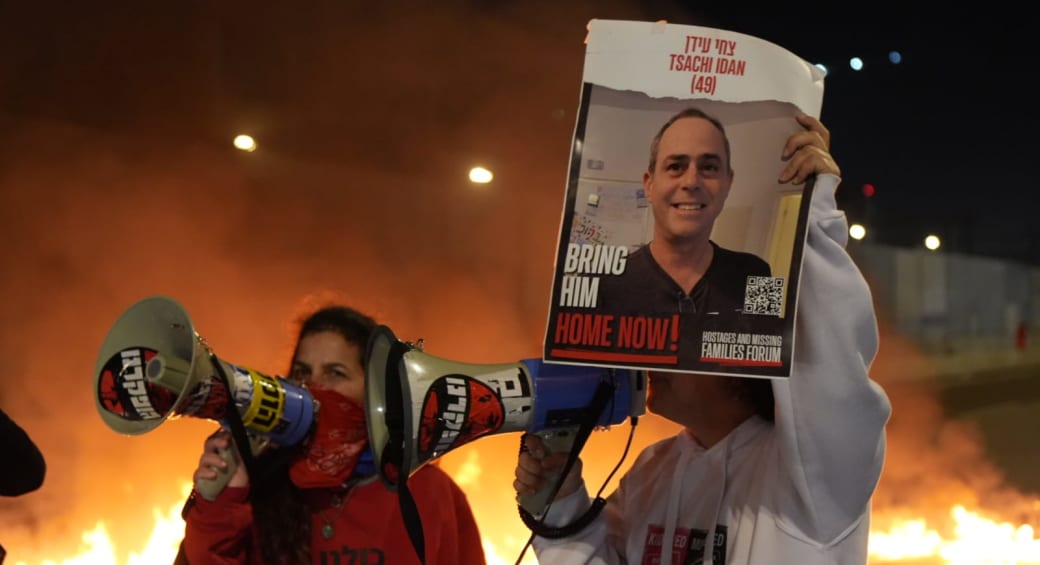
Herzog holds photo of Kfir Bibas who turns one in Gaza captivity
Bibas was kidnapped with his entire family from their home in Kibbutz Nir Oz when he was only nine months old.

After 104 days in Hamas's captivity, the youngest hostage, Kfir Bibas, turned one year old on Thursday.
Israeli President Herzog begins Davos address by showing a picture of Kfir and noting his birthday to the audience.
"This is Kfir Bibas. Kfir today, is celebrating one year since his birth. Exactly a year ago, he was born to his parents, Shiri, his mother, and his father, Yarden, and his brother Ariel," Herzog said.
"His whereabouts are unknown. We know he was kidnapped by Hamas. We know that these barbaric terrorists have taken him, his mother his brother, and his father. We know that they are going through hell, and we don't know their whereabouts.
"The enemy is basically advocating jihadism, celebrating and glorifying terror, celebrating and glorifying the abduction of Kfir Bibas," Herzog stated. "From here, this incredible world stage, I call upon the entire universe to work endlessly to free Kfir, and all the hostages that are there."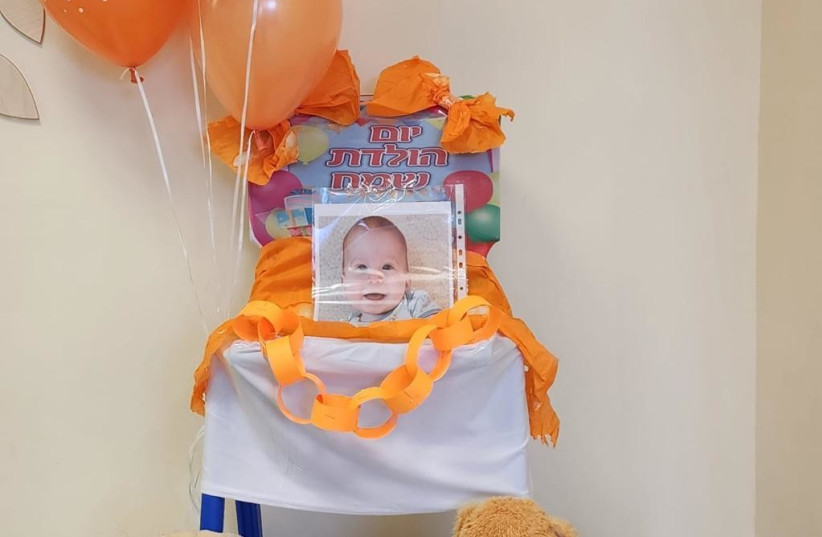
Today is Kfir Bibas's 1st birthday.
— Eylon Levy (@EylonALevy) January 18, 2024
He was abducted aged nine months.
He has now been a hostage of Hamas for one-quarter of his sorry life. pic.twitter.com/fiRYBacHlL
Bibas was kidnapped with his entire family from their home in Kibbutz Nir Oz when he was only nine months old. Approximately a quarter of his life has been held captive by a terrorist organization.
Bibas is the youngest hostage currently being held by Hamas.
The Rishon Lezion and Tel Aviv municipalities will light up the City Hall in both cities in orange, matching the color of his hair, N12 reported.
His birthday was celebrated by community members wishing for his return
Earlier this week, Kfir's birthday was celebrated at Kibbutz Nir Oz's children's home, with the community members wishing for his return together with his mother, Shiri, his father, Yarden, and his brother Ariel. Dozens of orange balloons were released in honor of the Bibas family, i24 News reported.
Last week, Israel's ambassador to the UN, Gilad Erdan, marked Kfir's birthday on the stage of the UN General Assembly, presented a cake in his honor and said: "I ask that Kfir's birthday cake remain on the podium as a painful memory of the baby who spent a quarter of his life in captivity."
Reuters contributed to this report.
Go to the full article >>IFCJ provides millions in aid, supports civilians impacted by war
"The one thing that gives us all tremendous hope is the friendship and support from the millions of Christians around the world who continue to stand with Israel and the Jewish people."

The International Fellowship of Christians and Jews revealed its massive contributions to Israel following the outbreak of the war, including $19 million in aid, on Thursday.
As the Israel-Hamas War reached its 100th day, the IFCJ marked the occasion by releasing details of its impactful initiatives throughout 2023. The organization has played a crucial role in providing emergency aid support to those affected by the ongoing conflict.
Immediate response to the outbreak of the war
Between October 7 and December 31, 2023, IFCJ delivered $19 million in emergency aid and assistance to hundreds of thousands of Israelis impacted by the war. In addition to this immediate relief, the organization has consistently provided aid and security measures over the decades to safeguard and support Israelis across the country.
Yael Eckstein, President and CEO of IFCJ, expressed gratitude for the unwavering support from donors and millions of Christians worldwide during these challenging times. “It has been 100 days of war, sorrow, and uncertainty. But after these 100 days, and especially now with the global rise in anti-Semitism, the one thing I’m certain about – and gives us all tremendous hope – is the friendship and support from our hundreds of thousands of donors and the millions of Christians around the world who continue to stand with Israel and the Jewish people,” she said.
IFCJ has contributed significantly to security efforts, including the transportation and installation of 30 portable bomb shelters along the northern border and in the Galilee region. Other measures include providing ballistic and protective flak jackets, helmets, medical and equipment bags, and fortified security vehicles to various teams across affected regions.
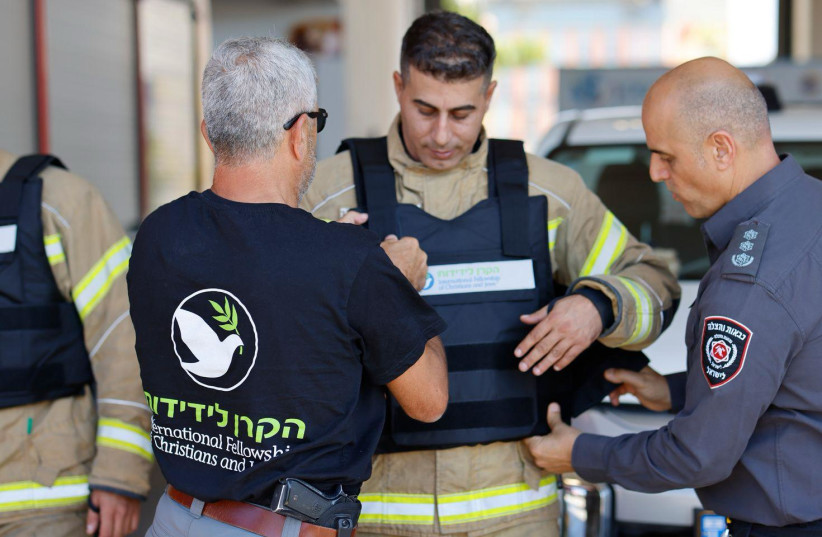
The organization has established support locations, including a Casualty Identification Center in Ramle, support to evacuees from Ashkelon at Givat Haviva campus, support to survivors of Kibbutz Nahal Oz at Kibbutz Mishmar Ha'emek, and support to evacuees from Ashkelon, Sderot, and Netivot at Kiryat Ono Campus.
Providing for communities along the Gaza Border
IFCJ has allocated $7 million for various basic needs and assistance to local communities near the Gaza border, addressing aspects such as food, medicine, hygiene products, transportation, evacuation, caretakers, and housing. Additionally, the organization provided $400,000 in support of a trauma organization and its helpline, as well as over $500,000 to 400 families of IDF personnel injured in combat.
The organization has extended support to evacuees through vouchers for essential needs, totaling 4,394 families. Furthermore, $166,000 has been allocated for transportation and housing for the elderly and families, including those with special needs. Respite kits with games and toys have been distributed to 3,900 children, including those with special needs.
IFCJ has been actively involved in distributing prepared meals and food boxes to various groups, including the elderly besieged in their homes, evacuees from settlements and cities around Gaza, and soldiers serving on the northern border.
“The Fellowship has been on the ground for more than 40 years, helping provide for the people of Israel and the Jewish people. We were on the ground distributing aid on October 7 as terrorists were still roaming our streets, and we have been doing so every day since,” Eckstein said. “In many ways, our work is really just beginning, but we will continue doing everything we can to help people begin to rebuild their lives.”
Go to the full article >>Released Hamas hostages, families meet with 150 world senior CEOs
The event took place at the World Economic Conference under the leadership of software company Palantir Technologies.
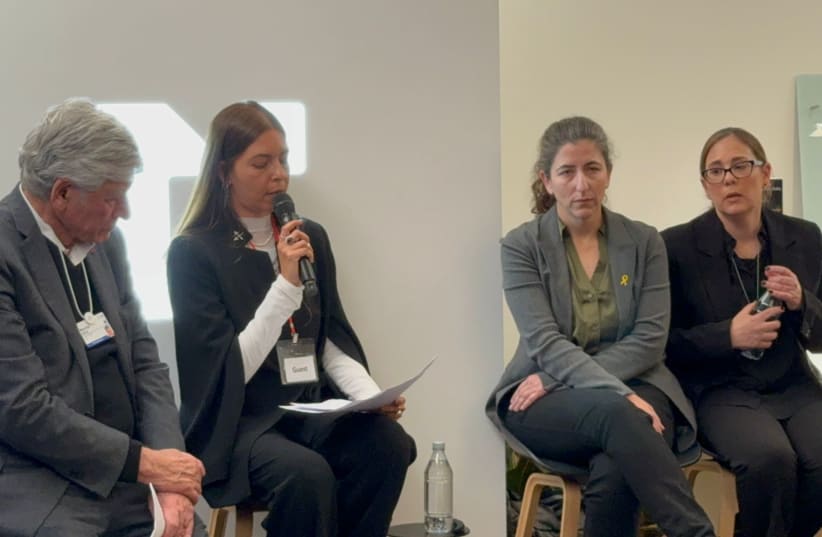
The Hostages and Missing Families Forum met with around 150 senior CEOs from the world economy on Wednesday in the town of Davos in eastern Switzerland.
Among the CEOs meeting with the families of hostages kidnapped by Hamas include Pfizer CEO Albert Bourla, Amazon CEO Andy Jassy, Amazon Web Services CEO Adam Selipsky, Dell Technologies CEO Michael Dell, Head of Meta's Global Business Group Nicola Mendelsohn, Bank of Israel Governor Amir Yaron, and Google CFO Ruth Porat.
The event took place at the World Economic Conference under the leadership of software company Palantir Technologies, whose owner and CEO, Alex Karp, is one of the biggest supporters of Israel in Silicon Valley with the support of the Israeli embassy to the UN in Geneva.
Nili Margalit and Stella Yanai, who were released from Hamas captivity, told the participants about the hostages still there and the urgent need to reach a deal that will bring them home before it's too late.
"When I was kidnapped, I was taken straight into an underground tunnel where I was held for 55 days until I was released. But most of the people I was in the tunnels with, are still held deep inside, scared and injured. By profession, I am a nurse in a children's emergency room, and I realized that there, too, I have to help and take care of those around me. But without medical supplies, this is an almost impossible task. In addition to injuries and sickness, there is not enough air to breathe and not enough food.
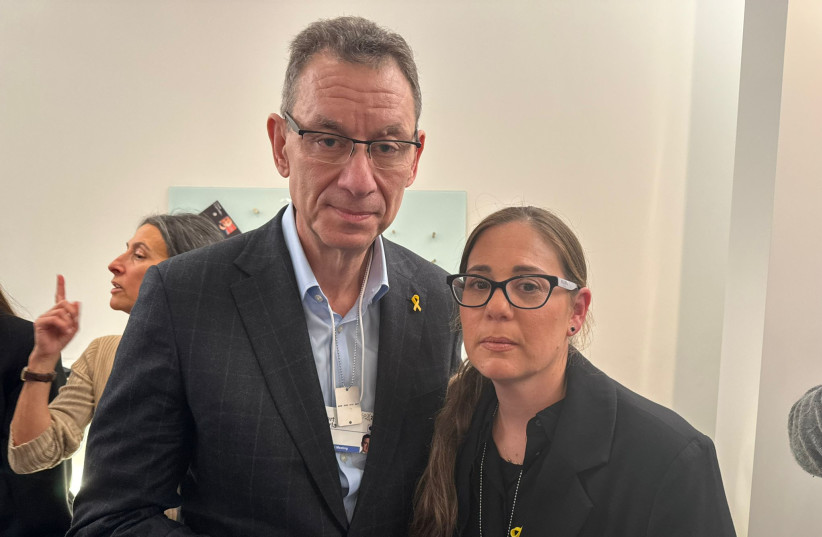
"The body is so weak that any disease can kill you. Imagine what it's like for an 80-year-old man with heart disease who can't hear and see well and sleeps on a mattress. I stand here before you today to testify about the hell I experienced. I am here to make their voice heard: speak up and tell their story and make sure you do everything you can to promote their release. The kidnapped could die every day! Every hour is dangerous for them."
Rachel Goldberg Poland, whose son Hirsch was kidnapped in Gaza, asked all the influential participants in the meeting to use their connections in order to promote a deal immediately and without delay that would secure the hostages' release.
Additional statements by families, released hostages
Moran Stella Yanai, who was kidnapped from the Nova party in Re'im and released from Hamas captivity, said, "I lost everything: control over my life, my freedom, my identity, my self. We cannot accept the possibility of being kidnapped from a music festival and not returning from it as a normal possibility. Because if not all the hostages return, every citizen in the world should now be afraid to go dancing at festivals! I was released, but I promised my friends I left behind in captivity that I would do everything in my power to bring them back.
"I lost everything: control over my life, my freedom, my identity, my self. We cannot accept the possibility of being kidnapped from a music festival and not returning from it as a normal possibility."
Moran Stella Yanai
"Last night, I received a message about the murder of two of my friends there, friends I was with during the dark days in Gaza. The terrorists watch television, which means that everything that happens in the world has an immediate effect on the daily lives of the hostages, and that's why I'm turning to you, I believe that you can put pressure on and lead to an end to this suffering."
Noam Perry, daughter of Haim Perry, a hostage still held by Hamas, said, "136 people are still being held captive in terrible conditions, some of them are being raped and sexually assaulted on a daily basis, and we have evidence of this.
"Four weeks ago, a video was released by Hamas showing my father, but today I don't know if he is still alive. We are hearing of moves towards a potential deal led by Qatar and the US. We need you, the most influential people in the world, the people with the power - try to imagine that it is your father or your daughter being dragged from their bedroom by terrorists and held in tunnels in Gaza for 103 days. What would you do to save them?
"Hamas's barbaric kidnapping, torture, and rape of innocent civilians are an obstacle to progress, and if we don't defeat it at the global level, Hamas will take all of humanity back hundreds of years."
Meirav Eilon Shahar, Israel's Permanent Representative to the UN, said "The Davos gathering is an opportunity to mobilize the heads of international companies to apply additional pressure for the release of all the hostages."
Go to the full article >>13 year-old hostage on Hamas captivity: 'Don't try to escape, they hate you'
"They understood that we wouldn't escape," Hila Rotem-Shoshani said. "Outside was also dangerous. Why would we run?"
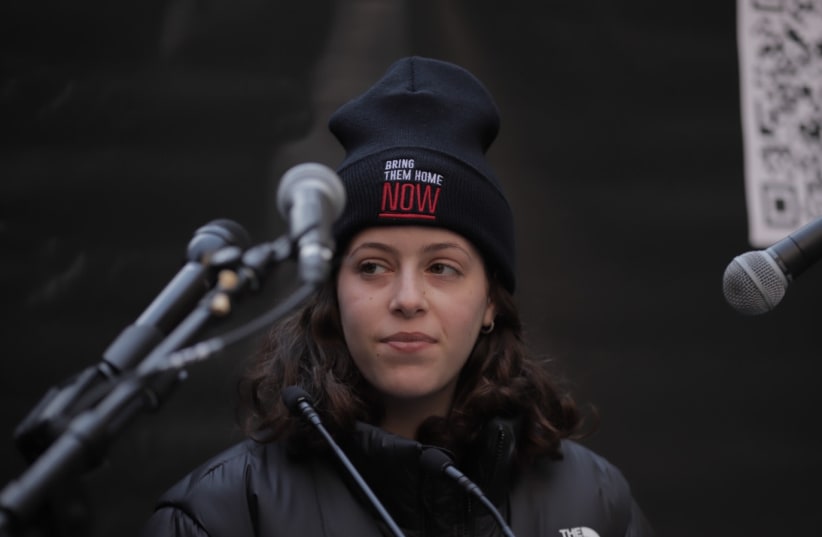
Hila Rotem-Shoshani, who was a hostage in Gaza, recounted the conditions and experiences in Hamas captivity in an interview with The New York Times on Wednesday.
"I heard the voices of kids outside, and we were kept with other people living inside the house. I forced myself to drink the little water that they gave me," were the first things she recounted. Her captors told her, "Don't try to escape, they hate you. If you go outside, they will hurt you."
Hila was kidnapped from her house in Kibbutz Be'eri, along with Emily Hand, who was staying at her house for a pajama party. When Hamas arrived and began raizing the Kibbutz, Hila and Emily, along with Raya Rotem, hid in the bomb shelter of her house. They were there for six hours. Eventually, the Hamas terrorists broke into the shelter with pistols and knives and took the three captive. They were forced into a car and had to witness burnt bodies and buildings along the way. One of the terrorists noticed Hila holding a doll, so he ripped it from her hands and threw it to the side of the road.
"The doll was in my hands the whole time; I didn't even notice," she said. "When you're scared, you don't pay attention."
Hila is the youngest of the hostages who returned to give a full interview about the conditions of captivity. She says that the car ride from her home into the Gaza Strip was the first time she understood "just how close" the Strip was to the community she grew up in.
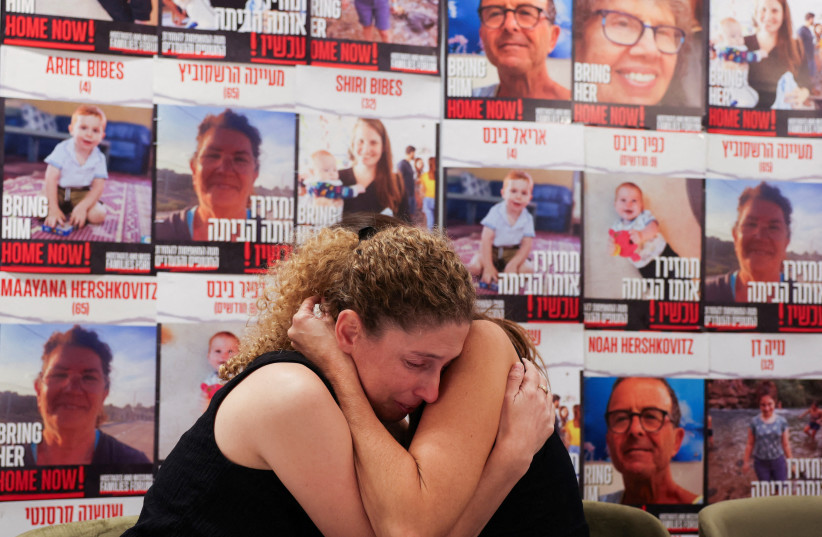
According to her, she was taken to a house along with two other hostages. In the beginning, they were kept in a room with an armed guard, but eventually were moved to the living room. "they understood that we wouldn't escape," she said. "Outside was also dangerous, why would we run?"
"The captors gave us little food, half of a pita, some halva, bean preserves, and a little bit of water." Sometimes the captors would eat, and the hostages wouldn't, she said, because there were "days that there simply wasn't food, and they kept it to themselves.
'We heard children's voices'
She continued, "Sometimes we heard the voices of other children, and we understood that there were more people in the house." Eventually, she and the other captives mustered up the courage to ask for permission to use the bathroom in the house, which is how Hila came to learn the word for it in Arabic- hammam.
She recalls one instance where an explosion caused the window of the room she was staying in to shatter. She also recalled several times they moved her in the middle of the night under the cover of darkness. They would tell her, "We're moving you to a safer location," she said. "However, we didnt know if that was the case or if we would be killed."
They told the girls to remain silent and to play cards. "But how often can you play cards, every hour of every day?" she said.
A month and a half after she was taken hostage, the captors separated the young girls from Hila's mother. "My mom began to worry that something wasn't right when they didn't take her," she said. She then added, "And then, they simply took us away, and she remained there."
The girls were released as part of the hostage deal at the end of November and returned to Israel. The separation of Hila and her mom disrupted the negotiation process, something that incited frustration across Israel. In the end, Hila's mother was released after a few days - the day after Hila's 13th birthday.
Go to the full article >>US vs. Houthis: New stage of Houthi threats emerges - analysis
What is clear now is that these attacks are not only increasing but settling into a new type of routine.
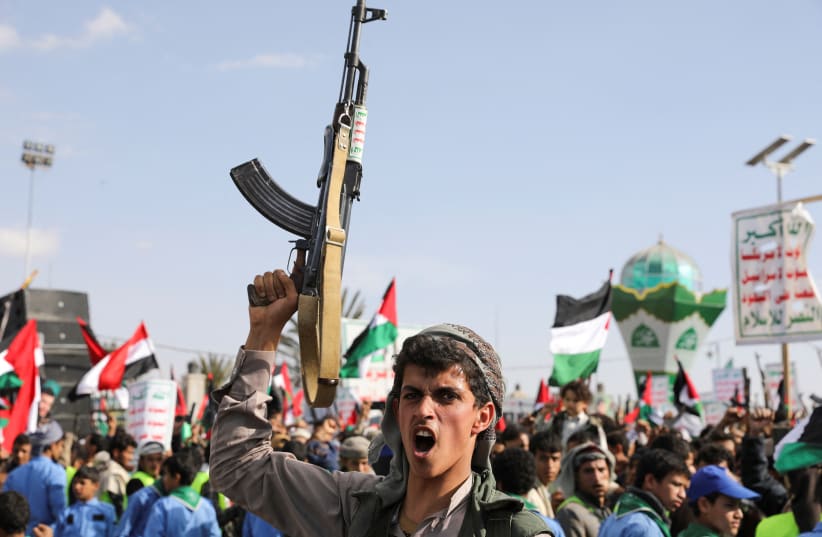
A new phase has begun in attempts to stop the Iran-backed Houthi attacks on shipping in the Red Sea and off the coast of Aden.
The US re-designated the Houthis as terrorists on January 17, which is an important step to provide the framework and legal means to confront the group. The re-designation also illustrates why the Houthis should never have been taken off the list of terrorist groups in the first place. The group had never shown any intention to stop the previous activity it was engaged in and it has only been emboldened by appeasement.
Now the Houthis are continuing to increase and widen their attacks in the Red Sea and in areas off the coast of Aden. According to a report yesterday, the Houthis have moved some of their missiles and drones, potentially increasing the areas they will target. The US, at the same time, is also increasing its strikes on the Houthis - leading to questions about what may come next. The Houthis have shown that they will not be deterred and that they will continue to attack targets of opportunity near the Red Sea.
US Central Command said overnight between Wednesday and Thursday morning that “in the context of ongoing multi-national efforts to protect freedom of navigation and prevent attacks on US and partner maritime traffic in the Red Sea, on January 17 at approximately 11:59 p.m. (Sanaa time), US Central Command forces conducted strikes on 14 Iran-backed Houthi missiles that were loaded to be fired in Houthi controlled areas in Yemen.”
Why is this important?
Striking the Houthi missiles and their launch sites can help to stop attacks on shipping. However, the Houthi storage facilities will also need to be eliminated. The Houthis have spent the last seven years stockpiling missiles. They have also been aided by Iran in this effort. They have a large arsenal of various types of drones and missiles, but they likely do not have enough precision missiles for anti-ship missions. They will rely on cheaper kamikaze drones for their attacks.
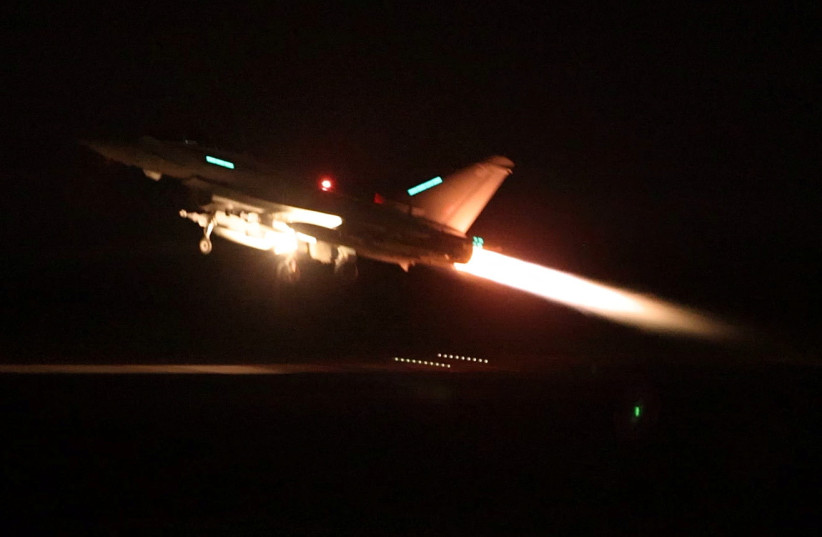
The US says that the recent strikes “along with other actions we have taken, will degrade the Houthi’s capabilities to continue their reckless attacks on international and commercial shipping in the Red Sea, the Bab-el-Mandeb Strait, and the Gulf of Aden.” This follows the decision on January 17 to designate the Houthis as terrorists. They had been designated as terrorists during the Trump administration, and the Biden administration chose to end that designation, apparently as part of a push for a ceasefire between the Iran-backed Houthis and Saudi Arabia.
In a strange twist of fate, the Saudis have now reconciled with Iran, and it is Riyadh that is now more cautious on the Houthi issue. Saudi has backed the Yemen government against the Houthis since 2015. The Iran-backed Houthis took advantage of the ceasefire and Iran-Saudi deal to focus attacks on the Red Sea. Iran is also pushing the Yemeni group to carry out more attacks. Ostensibly the Houthis claim they began their attacks due to the Gaza war. However, the larger picture is that they want to show they have the impunity to close the Red Sea to shipping, endangering the global economy.
On January 17, the Houthis attacked a ship called the Genco Pircardy using a drone. US Central Command noted that “at approximately 8:30 pm (Sanaa time) January 17, an assessed one-way attack UAS was launched from Houthi-controlled areas in Yemen and struck M/V Genco Picardy in the Gulf of Aden. M/V Genco Picardy is a Marshall Islands-flagged, US-owned and operated bulk carrier ship.”
That attack followed US strikes on January 16 and the Houthis targeting a ship called the Zografia on January 16. “US Forces struck and destroyed four Houthi anti-ship ballistic missiles prepared to launch from Houthi-controlled areas of Yemen,” the US said on January 16.
What is clear now is that these attacks are not only increasing but settling into a new type of routine. The US has now carried out at least three rounds of attacks while the Houthis are attacking ships daily. So far, despite the important decisions by the US Central Command, the Yemeni group is able to continue dangerous operations against shipping. A new phase has been entered in the war over the Red Sea and the Gulf of Aden. The question now is whether the US can stop the Houthi attacks.
Go to the full article >>IDF continues Khan Yunis operations, kills dozens of Hamas terrorists
In the city of Khan Yunis, IDF troops carried out a targeted raid based on intelligence, resulting in the death of around 40 terrorists.

The Israel Defense Forces (IDF) announced that their operations in the Gaza Strip persist as they target terrorist operatives and infrastructure. In the past day alone, approximately 60 terrorists were killed.
In the city of Khan Yunis, IDF troops carried out a targeted raid based on intelligence, resulting in the death of around 40 terrorists. The operation took place at the residence of a known terrorist, where troops uncovered ten grenades, AK-47 rifles, military equipment, and technological assets.
Magazines, grenades, AK-47 rifles, and maps were also discovered during the operation. Additionally, IDF troops identified four terrorists advancing toward them in Khan Yunis. Responding swiftly, an IDF tank fired, eliminating the imminent threat.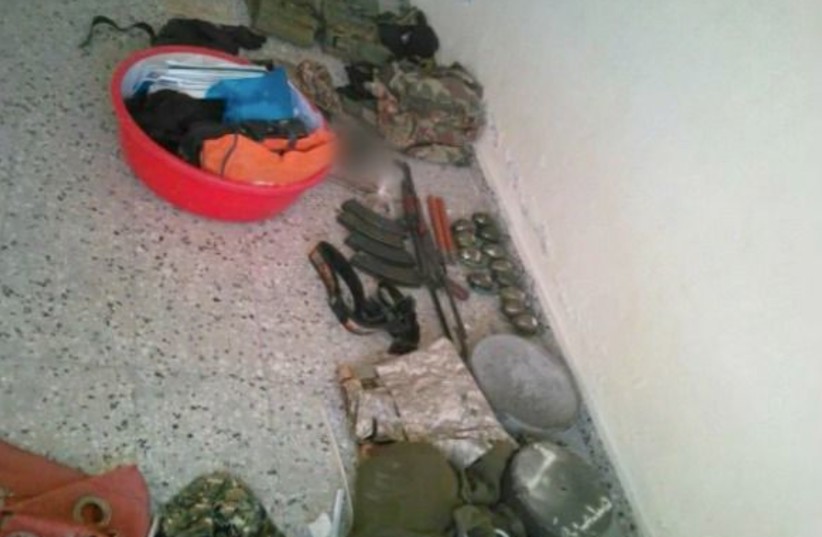
IDF thwarts Hamas ambushes
In the northern Gaza Strip, IDF forces successfully thwarted an ambush planned by two armed terrorists. A series of aerial strikes were conducted to neutralize armed terrorists posing a danger to IDF troops, including those operating in proximity to a school.
In Zabra, IDF troops discovered a cache of anti-tank explosive devices, RPG launchers, military equipment, and technological assets.
A significant development occurred in the northern Gaza Strip, where IDF forces intercepted terrorists preparing a vehicle with explosives. Simultaneously, as one of the terrorists exited a known Islamic Jihad compound, an IDF aircraft struck and killed the individual. Shots were fired at the rigged vehicle, leading to a subsequent explosion that confirmed the presence of explosives.
Go to the full article >>Ayelet Shaked: Netanyahu must agree on date for new elections after war
The former Justice Minister believes that "setting a date for the elections will prevent renewed rifts and mass demonstrations in Israel."
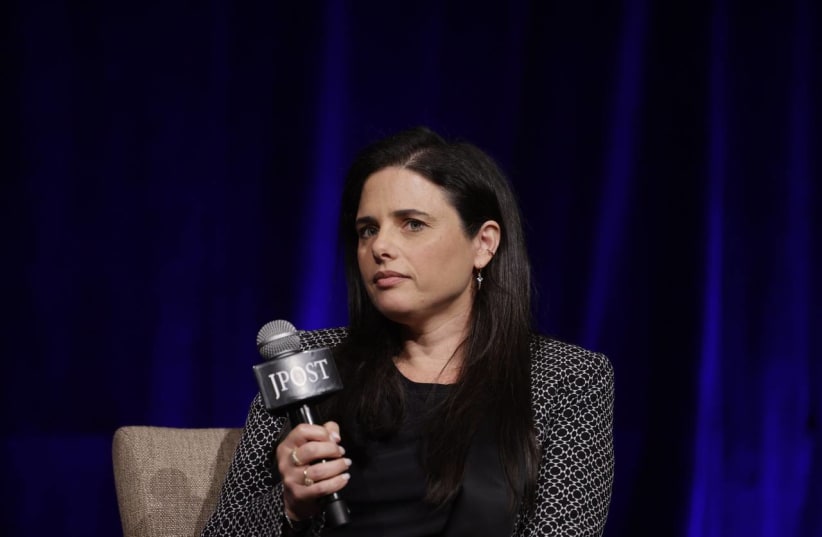
"The events of October 7 are the biggest failure of the state. After the end of the war, Prime Minister Benjamin Netanyahu must agree on a date for the elections in order to prevent another rift among the people. Whoever receives the people's trust will form a government," former justice minister Ayelet Shaked said in an interview with Maariv.
According to her, "There is no realistic chance of changing the composition of the government without elections. Setting a date for the elections will prevent renewed rifts and mass demonstrations among the people. This is the minimum the current government must do."
Shaked, who has become more private upon her retirement from politics, doesn't reveal if she has any political plans in the future and told Maariv that: "Israel is in a very complex situation. Sometimes I look at the situation with great sadness, but I am optimistic by nature. There are wonderful people, and you can see it in the generation of soldiers and civil society. I will not talk about my future political platform, and I don't know if it'll happen."
Shaked: "War will end when we have full military control of Gaza"
In response to a question about the end of the war, she adds that it "will happen when we have full military control over Gaza. I hope that the hostages will be returned and the situation in Lebanon will be settled, including the suppression of Hezbollah forces. This will happen this year, so we need elections this year.
"After the October 7 failure, the army must learn lessons. After the war, the military elite must put down the keys and resign. As far as the political level is concerned, having elections and not resignations is the right thing because it has a consensus and a majority of 70% of the people. The military has already taken responsibility, and I expect the same from the politicians led by Netanyahu. It has not happened yet."

Regarding the lawsuit in The Hague and the accusation of Israel of alleged genocide, the former Justice Minister stated that "South Africa is used as a political arm of Hamas. This is a discussion of a reverse antisemitic world. It's good that Israel came forward.
"The filing of the lawsuit should not be attributed to irresponsible statements by elected officials. They would've done it anyway. In my estimation, the lawsuit will be dismissed, although they may issue a declaratory order against us in the general form of the need for additional humanitarian aid and adherence to the rules of war, but not to the point of an immediate cessation of hostilities."
When asked about her role as chairperson of Kardan Real Estate, Shaked stated that "the market will recover quickly after the war. Many Jews will come to Israel following the new revelations of antisemitism around the world, and real estate demand will increase. However, the government is acting blindly. They don't allow Palestinian workers to come in, and they do not allow other solutions.
"The government hides its head in the sand, and the crisis will only get worse. There will be fewer construction projects and just more demands. I don't see prices dropping further in the coming year. Towards the end of 2024, there will be increases in prices in some places, a trend which will strengthen in 2025."
Go to the full article >>Behind Bibi's back? Senior US officials met with Israeli opposition - report
Secretary of State Antony Blinken is increasing pressure on Prime Minister Benjamin Netanyahu regarding the future of the Gaza Strip.
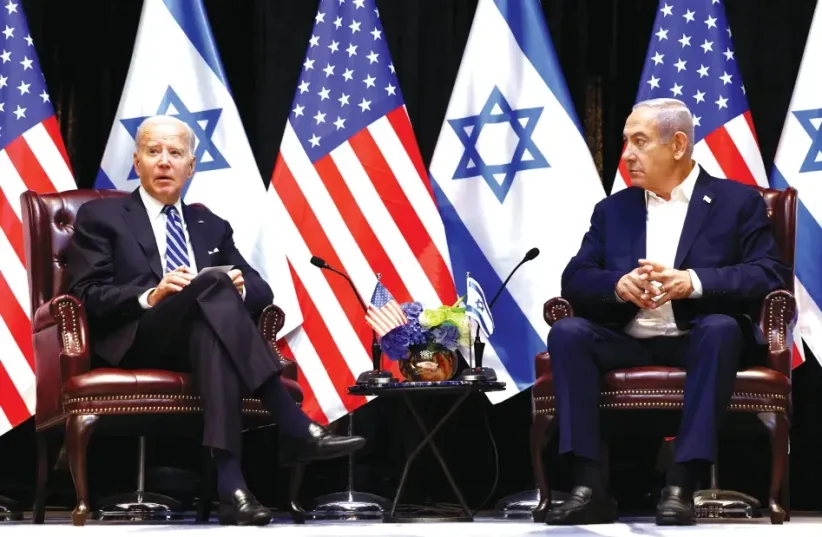
The Biden administration is trying to lay the groundwork for the establishment of a Palestinian state with Israeli leaders and representatives of civil society, expecting a future post-Netanyahu government: "He will not remain there forever."
According to NBC, Secretary of State Antony Blinken is increasing pressure on Prime Minister Benjamin Netanyahu regarding the future of the Gaza Strip, revealing growing frustration within the Biden administration regarding differences with Netanyahu on the issue.
"We have today a profound regional opportunity in the Middle East that we did not have in the past," said Blinken during an interview at the World Economic Forum in Davos, Switzerland. "The challenge is to realize it." When asked if Netanyahu is the right prime minister to seize this opportunity, Blinken responded that "these are decisions that Israelis need to make" and added, "We are at a turning point."
Blinken's comments come just a week after his visit to the Middle East in an attempt to build consensus between Israel and Arab leaders on the post-war plan with Hamas in Gaza. According to senior officials, the gaps between the Biden administration and Netanyahu on the war, as well as the Israeli Prime Minister's refusal to consider US proposals for Gaza after the war, have deepened since Blinken's visit to Israel about a week ago.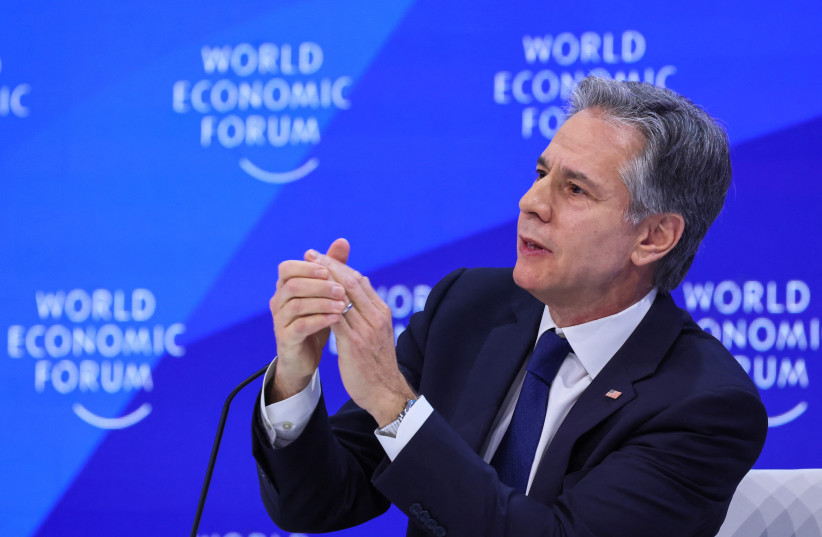
Arab leaders agree on new Palestinian rule in Gaza
According to officials, the Secretary of State returned to Washington after Netanyahu rejected all government requests except one: the understanding that Israel would not attack Hezbollah in Lebanon. In the midst of this, Blinken's main achievement during his visit was a commitment from Saudi Crown Prince Mohammed bin Salman and four other Arab leaders to assist in the reconstruction of Gaza after the war.
The Arab leaders also agreed to support a new and improved Palestinian government that would secure Gaza, according to government officials. Additionally, the Saudi Crown Prince offered to normalize relations with Israel as part of a Gaza reconstruction deal – a diplomatic breakthrough that Netanyahu has sought for a long time, but only on the condition that Palestinians are given a prospect for their own state.
However, Netanyahu rejected the proposal for the establishment of a Palestinian state. Now, three senior Americans have conveyed that the Biden administration is looking beyond Netanyahu to try and achieve US goals in the region. They told NBC that "Netanyahu will not be there forever."
Blinken told the Israeli leader that there was no military solution to Hamas at the end of the day and that the Prime Minister needed to acknowledge this or history would repeat itself, and violence would persist, but Netanyahu refused to relent.
The senior officials noted that the Biden administration is trying to lay the groundwork with other Israeli leaders and representatives of civil society in anticipation of a future post-Netanyahu government. In an attempt to bypass Netanyahu, Blinken also separately met with members of the diplomatic security cabinet and other Israeli leaders, including opposition leader Yair Lapid, during his visit to the Middle East.
Blinken's goal in the Middle East was to present Netanyahu with a unified Arab proposal after the war, as part of Biden's hopes to reshape the Middle East and establish a Palestinian state. A senior government official acknowledged that this is likely to wait for the post-Netanyahu era.
NBC also reported that tensions between the two leaders have manifested in the absence of direct communication between them in recent weeks. The last known conversation between Netanyahu and Biden took place on December 23, over three weeks ago.
Go to the full article >>Hezbollah rejects US overtures, still open to diplomacy to avoid wider war
Hezbollah's position is that it will fire rockets at Israel until there is a full ceasefire in Gaza. Hezbollah's rejection of the proposals presented by Hochstein has not been previously reported.

Iran-backed Hezbollah has rebuffed Washington's initial ideas for cooling tit-for-tat fighting with neighboring Israel, such as pulling its fighters further from the border, but remains open to US diplomacy to avoid a ruinous war, Lebanese officials said.
US envoy Amos Hochstein has been leading a diplomatic outreach to restore security at the Israel-Lebanon frontier as the wider region teeters dangerously towards a major escalation of the conflict ignited by the Gaza war.
Attacks by Yemen's Iran-aligned Houthis on shipping in the Red Sea, US strikes in response and fighting elsewhere in the Middle East have added urgency to the efforts.
"Hezbollah is ready to listen," a senior Lebanese official familiar with the group's thinking said while emphasizing that the group saw the ideas presented by veteran negotiator Hochstein on a visit to Beirut last week as unrealistic.
Hezbollah's position is that it will fire rockets at Israel until there is a full ceasefire in Gaza. Hezbollah's rejection of the proposals presented by Hochstein has not been previously reported.
Despite the rejection and Hezbollah's volleys of rockets in support of Gaza, the group's openness to diplomatic contacts signals an aversion to a wider war, one of the Lebanese officials and a security source said, even after an Israeli strike reached Beirut on January 2, killing a Hamas leader.
Israel has also said it wants to avoid war, but both sides say they are ready to fight if necessary. Israel warns it will respond more aggressively if a deal to make the border area safe is not reached.
Such an escalation would open a major new phase in the regional conflict.
Branded a terrorist organization by Washington, Hezbollah has not been directly involved in talks, three Lebanese officials and a European diplomat said. Instead, Hochstein's ideas were passed on by Lebanese mediators, they said. Reuters consulted eleven Lebanese, US, Israeli, and European officials for this story.
One suggestion floated last week was that border hostilities be scaled back in tandem with Israeli moves towards lower intensity operations in Gaza, the three Lebanese sources and a US official said.
A proposal was also communicated to Hezbollah that its fighters move 7 km (4 miles) from the border, two of the three Lebanese officials said. That would leave fighters much closer than Israel's public demand of a 30 km (19 mile) withdrawal to the Litani River stipulated in a 2006 UN resolution.
Hezbollah has dismissed both ideas as unrealistic, the Lebanese officials and the diplomat said. The group has long ruled out giving up weapons or withdrawing fighters, many of whom hail from the border region and melt into society at times of peace.
Israel's Prime Minister's office declined to comment on "reports of diplomatic discussions" in response to questions from Reuters for this story. Spokespeople for Hezbollah and the Lebanon government did not immediately respond to detailed requests for comment.
The White House declined to comment on Reuters' reporting.
Hezbollah has, however, signaled that once the Gaza war is over, it could be open to Lebanon negotiating a mediated deal over disputed areas at the border, the three Lebanese officials said, a possibility alluded to by Hezbollah's leader in a speech this month.
"After the war in Gaza, we are ready to support Lebanese negotiators to turn the threat into opportunity," one senior Hezbollah official told Reuters, speaking on the condition of anonymity. He did not address specific proposals.
Hezbollah previously held fire during a 7-day Gaza truce in late November.
Israeli government spokesperson Eylon Levy, in response to a Reuters question at a media briefing on Wednesday, said there was "still a diplomatic window of opportunity," to push Hezbollah away from the border.
Hochstein has a track record of successful mediation between Lebanon and Israel. In 2022, he brokered a deal delineating the countries' disputed maritime boundary - an agreement sealed with Hezbollah's behind-the-scenes approval.
Lebanese Prime Minister Najib Mikati, in whose cabinet Hezbollah has ministers, has said Beirut was ready for talks on long-term border stability.
During his January 11 visit to Beirut, Hochstein met Mikati, the parliament speaker and army commander. He said publicly at the time that the United States, Israel and Lebanon all preferred a diplomatic solution.
Hochstein was hopeful "all of us on both sides of the border" could reach a solution to allow Lebanon and Israel to live with guaranteed security, he told reporters.
The spearhead of the Iran-aligned "Axis of Resistance", Hezbollah was drawn into a battle it has said it did not expect when Palestinian ally Hamas stormed Israel on October 7, triggering a conflict that has also spilled into the Red Sea, where US strikes have targeted Yemen's Houthis over their attacks on shipping.
Hezbollah has said its campaign has aided Palestinians by stretching Israeli forces and driving tens of thousands of Israelis from their homes.
It has come at a cost, with around 140 Hezbollah fighters and at least 25 Lebanese civilians killed, as well as at least nine Israeli soldiers and a civilian. The intensity has been growing in recent weeks.
Hezbollah, founded by Iran's Revolutionary Guards in 1982, is the most powerful and influential of the groups Iran backs. It has played a big part in Tehran's wider foreign policies.
Sources familiar with Hezbollah thinking have said it knows all-out war would be ruinous for Lebanon, a country already destabilized by years of financial and political crises, and where Hezbollah's vast arsenal has long been a point of contention. Experts say the cache includes more than 100,000 rockets.
Even as Iran-aligned fighters draw US fire elsewhere in the region and Iran launches strikes in Syria and Iraq, Tehran would be loathe to see Hezbollah and Lebanon subjected to massive destruction, not least because it has previously had to foot the bill of reconstruction, said Mohanad Hage Ali, deputy director of the Carnegie Middle East Center, a think-tank based in Beirut.
Iran's foreign minister on Wednesday said attacks against Israel and its interests by the "Axis of Resistance" will stop if the Gaza war ends.
Hage Ali said Hezbollah clearly wanted to avoid full-scale conflict. It did not want to be left in a situation where Israeli strikes continue or intensify in Lebanon after the Gaza war ends or is significantly scaled back, he said.
"A process in which it can engage, or support, the Lebanese state as it negotiates would provide the benefits of de-escalation," he said.
"Threats and inducements"
The diplomacy faces significant complications, and many observers see a serious risk of an escalation in fighting. Israel has said its army will act if diplomacy cannot restore security to northern Israel.
Hezbollah leader Sayyed Hassan Nasrallah said the group had heard "threats and inducements."
The threat, Nasrallah said in a January 15 speech, was the warning that Israel would move forces to its northern border as it shifts to the next phase of the Gaza war. Hezbollah was ready for war and would fight without "any limits, rules or boundaries," he said.
But he has also alluded to diplomatic possibilities, saying in a January 5 speech that once the Gaza war was over Lebanon had "a historic opportunity" to liberate land.
Those comments were widely interpreted as reflecting the possibility of a negotiated deal settling the status of disputed border areas.
Four Lebanese officials briefed on the matter said Hochstein has discussed ideas aimed at advancing such a deal, but he had not presented any draft proposals. The officials did not provide details of the ideas.
An Israeli official told Reuters Israel's government has "relayed lots of demands," without giving details. "One way or another, our 80,000 northern residents will be returning home," the official said.
France has also been involved in de-escalation efforts. A source familiar with French thinking said Nasrallah's public comments alluding to a possible border deal were "direct messages to the Americans and to the French."
"He's telling us: 'the door is open'."
Go to the full article >>Seven IDF Navy soldiers injured after vessel capsizes

Seven soldiers of the IDF's Navy were slightly injured on Wednesday evening after the vessel they were on capsized in the middle of the sea, Hebrew media reported.
The seven were taken to Barzilai Medical Center in Ashkelon for medical treatment. The base commander said that the case would be investigated immediately.
Israel-Hamas War: What you need to know
- Hamas launched a massive attack on October 7, with thousands of terrorists infiltrating from the Gaza border and taking some 240 hostages into Gaza
- Over 1,200 Israelis and foreign nationals were murdered, including over 350 in the Re'im music festival and hundreds of Israeli civilians across Gaza border communities
- 132 hostages remain in Gaza, IDF says